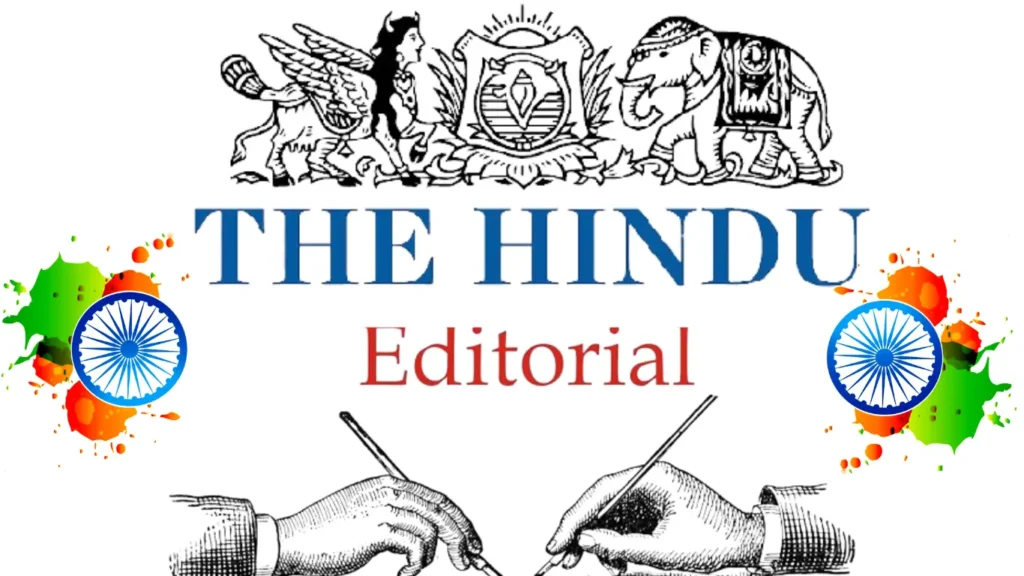Analysis of The Hindu Editorial 1: India’s defence exports and humanitarian law
Context
India should consider amending its domestic laws to strengthen its credibility and assess if countries importing its defence goods comply with international humanitarian law (IHL). This will enhance India’s standing as a responsible defence exporter.
Introduction
Recently, the Supreme Court of India dismissed a public interest litigation (PIL) seeking to halt defence exports to Israel, alleging war crimes in Gaza. The court refused to intervene, stating that foreign policy decisions were outside its jurisdiction. However, the issue raised in the PIL goes beyond Israel and impacts India’s goal of becoming a major defence exporter.
Global Restrictions on Defence Exports
Several countries have restricted defence exports to Israel due to concerns about IHL violations. For example, a Dutch court blocked the export of F-35 fighter jet parts to Israel based on an EU regulation that bans military exports when there is a risk of violating IHL. Similarly, the UK reviewed Israel’s IHL compliance under its Export Control Act and found a clear risk that certain arms exports to Israel could facilitate IHL violations.
India’s Legal Gap
India lacks an equivalent law, like the UK’s Export Control Act or EU regulations, that assesses a country’s IHL compliance before approving defence exports. The Foreign Trade Act of 1992 (FTA) and the Weapons of Mass Destruction (WMDA) Act of 2005 allow the government to regulate exports for reasons like national security and international obligations. However, there is no requirement for India to review a recipient country’s IHL compliance.
Supreme Court’s Role
In previous cases, such as Vishakha vs State of Rajasthan, the Supreme Court has used international law to fill gaps in domestic law. This could be a potential approach to address India’s lack of legislation on IHL compliance in defence exports.
International Law
The Arms Trade Treaty (ATT) regulates the international arms trade, barring exports if the arms would likely be used to commit war crimes. While India is not a signatory to this treaty, some provisions reflect customary international law. The Geneva Conventions, which India is bound by, also obligate countries to ensure their exports do not contribute to IHL violations.
Conclusion
India should amend its domestic laws, such as the WMDA and FTA, to explicitly require an evaluation of a country’s IHL compliance before exporting defence goods. This would solidify India’s position as a responsible defence exporter and align with international humanitarian standards
Analysis of The Hindu Editorial 2: Women on the margins of the political sphere in J&K
Context
Women’s political representation in Jammu & Kashmir (J&K) remains limited and is still an exception rather than the norm.
Introduction
As J&K enters the second phase of Assembly elections on September 25, the continued marginalization of women in politics needs urgent attention.
Data on Women’s Representation
Despite women making up nearly 48% of the electorate, their political presence is minimal. In the 2014 J&K Assembly elections, only 3.6% of the candidates were women. In 2024, just nine women participated in the first phase out of 219 candidates.
Barriers to Women’s Political Involvement
- Patriarchal dominance: Politics in J&K is heavily male-dominated, shaped by traditional patriarchal norms.
- Safety concerns and instability: The region’s volatility discourages women from participating in public and political life.
Efforts to Include Women
- Hopes for better representation: Legal efforts, like the 33% reservation for women in the J&K Assembly, have been made. However, cultural and institutional barriers still limit women’s political engagement.
- Neglect by major political parties: The National Conference and People’s Democratic Party have historically sidelined women in leadership roles.
- Lack of political support from women leaders: Even female leaders like former Chief Minister Mehbooba Mufti have struggled to challenge male-dominated political structures.
- Token representation: Women are often fielded as candidates in unwinnable constituencies or in minor roles. Despite 33% of District Development Council seats being reserved for women in 2020, actual representation was only around 10%.
Lack of Women-Centric Policies
- There are no dedicated policies addressing women’s economic, social, and political empowerment in J&K.
- Major political parties have not prioritized reserving seats for women or introducing gender-sensitive economic policies.
- Despite improved literacy rates, the gender gap persists, with 66% of women being literate compared to 84% of men.
- Women’s labor force participation remains low at around 25%, and there are no significant funds or reforms targeting women’s empowerment.
Importance of Elections
Elections are meant to ensure fair representation, but women’s underrepresentation in J&K weakens democracy. Without female voices, policies fail to address gender disparities and reinforce patriarchal norms. To achieve inclusive governance, it is essential to implement policies that focus on women’s needs in areas like education, healthcare, and employment.
Way Forward
- Incorporate women’s perspectives: Involving women in key areas like peace-building, education, and healthcare will amplify their voices and promote political participation.
- Support female politicians: Providing free childcare, healthcare, and family support for women in politics will help ease their entry and longevity in political roles.
- Implement political quotas: Introducing political quotas, as seen in Rwanda, where 60% of parliamentarians are women, could help transform the political landscape in J&K.
Conclusion
With the abrogation of Article 370 in 2019, J&K is now subject to central laws, including the National Policy for Empowerment of Women (2001). These laws provide a foundation to encourage greater participation of women in politics. By supporting women’s involvement in decision-making, J&K can foster a more inclusive society and strengthen its democracy. It is crucial to boost women’s representation for sustainable growth and a prosperous future for J&K.

